ACUPUNCTURE

About LOUISE
Louise began her practice in Huntingdon, Qc. in 2001, after moving to the Valley from Montreal. In 2006, Louise moved her office to Ormstown, where she is currently located.
Louise Robinson is a member of the Quebec Professional Order of Acupuncturists and of the Quebec Association of Acupuncturists.
About Acupuncture
Acupuncture is one of the treatment modalities of Traditional Chinese Medicine(TCM) most widely used, recognized and taught in the Western world. It presupposes the existence of vital energy, or “Qi” (pronounced “chi”), that is essential to life, and that flows throughout the body. This energy is transported by a system of channels called meridians. These meridians represent indeed a large network of external (surface) and internal pathways that enable a connection between the outer and inner aspects of our bodies.
Acupuncture points are found on the external aspects and at very specific locations along these meridians. These points, mapped and documented for thousands of years by the Chinese and Asian societies (Japanese, Korean, Vietnamese, Taiwanese, etc. ), have their own characteristics and indications.
The selection and method of stimulation of these points are determined by the acupuncturist and based on the Traditional Chinese Medicine energy and pattern diagnosis. By selecting a combination of points, the treatment will have an effect on a determined bodily organ, area or function, and therefore act on a set of varied symptoms and/or on the initial cause of the imbalance.
THE BENEFITS OF ACUPUNCTURE
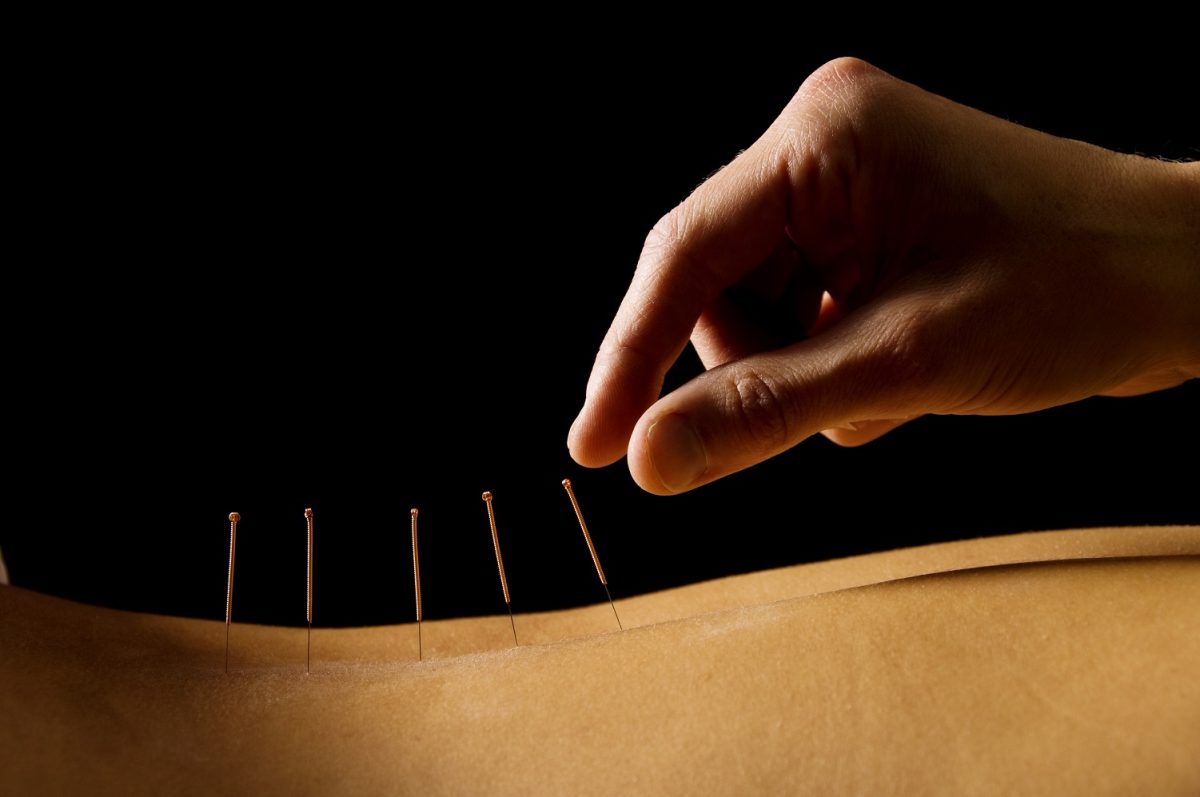
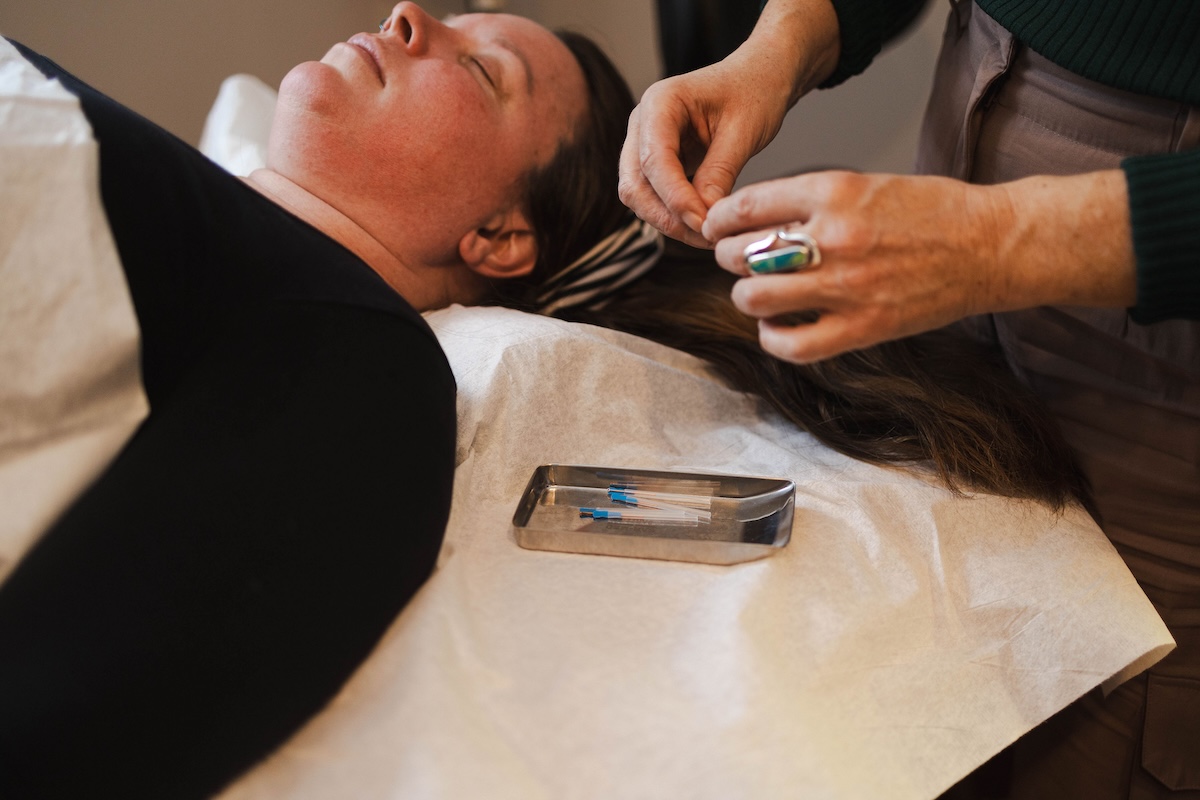
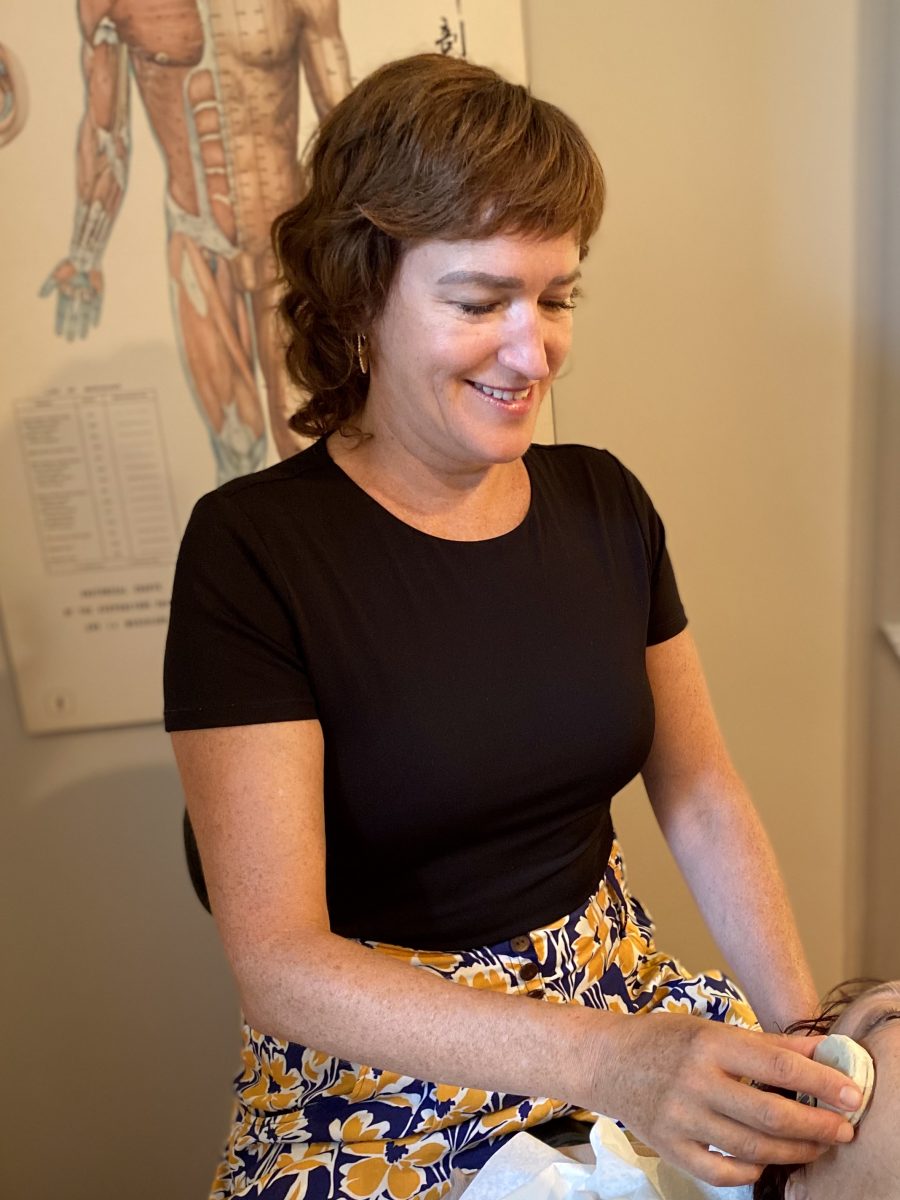
The effects of acupuncture on our bodies:
Analgesic: The most commonly known effect of acupuncture is the relief or reduction of pain
Sedation: Acupuncture decreases the delta and theta wave activity in the brain resulting in deep relaxation and/or sleep. This effect allows an acupuncturist to effectively treat conditions such as insomnia, anxiety, addictions, epilepsy, mental disorders and stress.
Psychological: There is a calming and tranquilizing action in addition to the sedative effect. Measurable changes in brain chemistry have been observed.
Homeostatic: This refers to the internal state of the body returning to a natural balance. This involves the sympathetic, parasympathetic divisions of the nervous system and endocrine system.
Immune Enhancing: Acupuncture can strengthen the body against disease.
Restoration: by stimulating the points and aiming for a free flow of energetic circulation, acupuncture helps local circulation, tissue oxygenation and regeneration in order to promote the natural healing aspects of our bodies.
CONDITIONS TREATED WITH ACUPUNCTURE
Acupuncture can have an impact on the following systems or conditions
Hay fever, seasonal and other various allergies.
Ear pain, certain types of hearing loss, ringing in the ears, tinnitus, Ménière’s disease.
Numbness, cold limbs, chills, swelling, edema, hypertension, hypotension.
Cosmetic acupuncture can help relax facial muscles, reducing the appearance of fine lines and wrinkles, it stimulates the production of collagen, which gives skin its elasticity and firmness, as well as improving the blood circulation, which helps to nourish the skin cells, promoting a healthier complexion.
Eczema, shingles, boils, dermatitis, psoriasis, acne, urticaria, athlete’s foot.
Ulcer, dyspepsia, stomach pain in general, loss of appetite, anorexia, hiccups, difficulty swallowing, colitis, bowel disorders, diarrhea, constipation, bloating, hemorrhoids, gallbladder and liver disorders, vomiting.
Vaginitis, painful, heavy or irregular periods, amenorrhea, menopause, loss of sex drive, genital problems, impotence, problems related to pregnancy.
Hemiplegia, certain types of paralysis, certain types of atrophy and muscular dystrophy.
Vision problems, conjunctivitis, certain types of vision loss, glare, cataracts, glaucoma, black spots.
Acupuncture has proven to be helpful and complementary with the following: Diabetes, arteriosclerosis, cholesterol, hypoglycemia, hyperglycemia, anemia, mononucleosis, epilepsy, Parkinson’s disease, multiple sclerosis, ataxia, myelitis, fibromas certain oncology realities.
Nervousness, anxiety, insomnia, stuttering, nervous tics, phobias, depression, generalized fatigue, obsessions, nightmares, bulimia, vertigo, tremors, loss of balance.
Arthritis, rheumatoid arthritis, torticollis, neck pain, sciatica, low back pain, muscle pain, headache, migraines, sports injuries, epicondylitis, cramps, sprains, bursitis, trigeminal neuralgia, facial neuralgia, knee problems.
Asthma, bronchitis, emphysema, laryngitis, sinusitis, rhinitis, cough, cold, flu, dyspnea.
It can also help with addiction problems: cigarettes, drugs, alcohol, obesity.
Prostate problems, cystitis, incontinence, difficulty urinating.
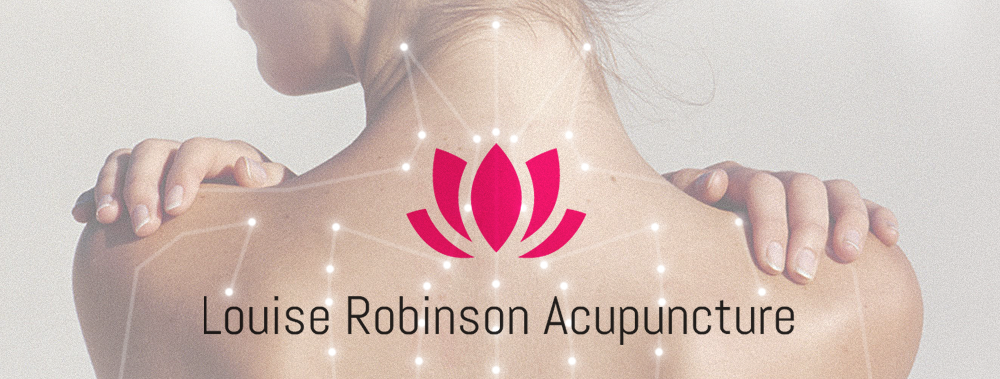
Contact Louise
Available at the Jai Ma Wellness Centre Monday, Tuesday, Thursday and Friday.
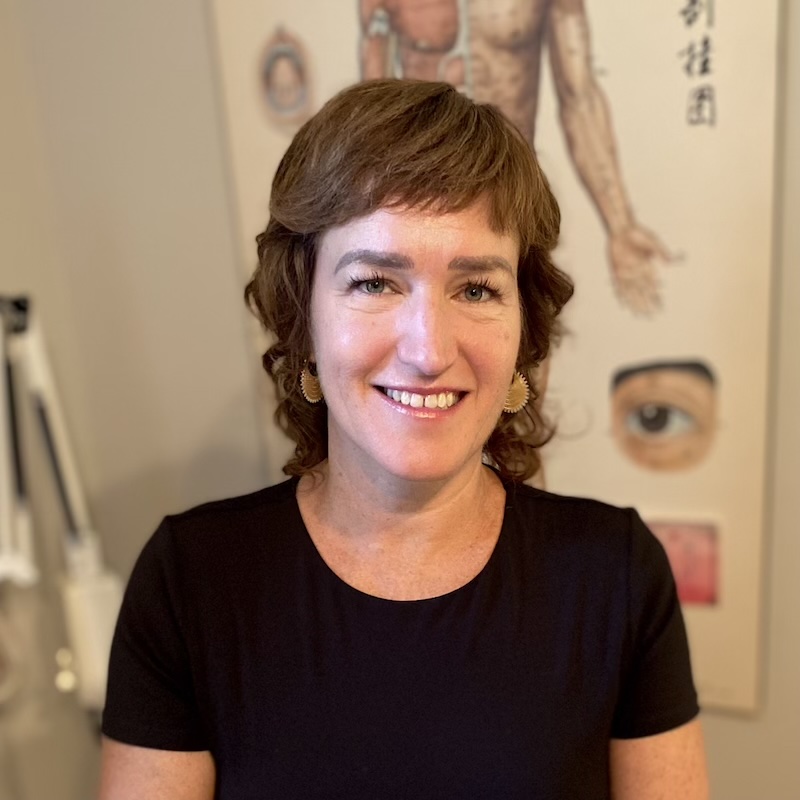
About LOUISE
Louise began her practice in Huntingdon, Qc. in 2001, after moving to the Valley from Montreal. In 2006, Louise moved her office to Ormstown, where she is currently located.
Louise Robinson is a member of the Quebec Professional Order of Acupuncturists and of the Quebec Association of Acupuncturists.
About Acupuncture
Acupuncture is one of the treatment modalities of Traditional Chinese Medicine(TCM) most widely used, recognized and taught in the Western world. It presupposes the existence of vital energy, or “Qi” (pronounced “chi”), that is essential to life, and that flows throughout the body. This energy is transported by a system of channels called meridians. These meridians represent indeed a large network of external (surface) and internal pathways that enable a connection between the outer and inner aspects of our bodies.
Acupuncture points are found on the external aspects and at very specific locations along these meridians. These points, mapped and documented for thousands of years by the Chinese and Asian societies (Japanese, Korean, Vietnamese, Taiwanese, etc. ), have their own characteristics and indications.
The selection and method of stimulation of these points are determined by the acupuncturist and based on the Traditional Chinese Medicine energy and pattern diagnosis. By selecting a combination of points, the treatment will have an effect on a determined bodily organ, area or function, and therefore act on a set of varied symptoms and/or on the initial cause of the imbalance.
THE BENEFITS OF ACUPUNCTURE

The effects of acupuncture on our bodies:
Analgesic: The most commonly known effect of acupuncture is the relief or reduction of pain
Sedation: Acupuncture decreases the delta and theta wave activity in the brain resulting in deep relaxation and/or sleep. This effect allows an acupuncturist to effectively treat conditions such as insomnia, anxiety, addictions, epilepsy, mental disorders and stress.
Psychological: There is a calming and tranquilizing action in addition to the sedative effect. Measurable changes in brain chemistry have been observed.
Homeostatic: This refers to the internal state of the body returning to a natural balance. This involves the sympathetic, parasympathetic divisions of the nervous system and endocrine system.
Immune Enhancing: Acupuncture can strengthen the body against disease.
Restoration: by stimulating the points and aiming for a free flow of energetic circulation, acupuncture helps local circulation, tissue oxygenation and regeneration in order to promote the natural healing aspects of our bodies.


CONDITIONS TREATED WITH ACUPUNCTURE
Acupuncture can have an impact on the following systems or conditions
Hay fever, seasonal and other various allergies.
Ear pain, certain types of hearing loss, ringing in the ears, tinnitus, Ménière’s disease.
Numbness, cold limbs, chills, swelling, edema, hypertension, hypotension.
Cosmetic acupuncture can help relax facial muscles, reducing the appearance of fine lines and wrinkles, it stimulates the production of collagen, which gives skin its elasticity and firmness, as well as improving the blood circulation, which helps to nourish the skin cells, promoting a healthier complexion.
Eczema, shingles, boils, dermatitis, psoriasis, acne, urticaria, athlete’s foot.
Ulcer, dyspepsia, stomach pain in general, loss of appetite, anorexia, hiccups, difficulty swallowing, colitis, bowel disorders, diarrhea, constipation, bloating, hemorrhoids, gallbladder and liver disorders, vomiting.
Vaginitis, painful, heavy or irregular periods, amenorrhea, menopause, loss of sex drive, genital problems, impotence, problems related to pregnancy.
Hemiplegia, certain types of paralysis, certain types of atrophy and muscular dystrophy.
Vision problems, conjunctivitis, certain types of vision loss, glare, cataracts, glaucoma, black spots.
Acupuncture has proven to be helpful and complementary with the following: Diabetes, arteriosclerosis, cholesterol, hypoglycemia, hyperglycemia, anemia, mononucleosis, epilepsy, Parkinson’s disease, multiple sclerosis, ataxia, myelitis, fibromas certain oncology realities.
Nervousness, anxiety, insomnia, stuttering, nervous tics, phobias, depression, generalized fatigue, obsessions, nightmares, bulimia, vertigo, tremors, loss of balance.
Arthritis, rheumatoid arthritis, torticollis, neck pain, sciatica, low back pain, muscle pain, headache, migraines, sports injuries, epicondylitis, cramps, sprains, bursitis, trigeminal neuralgia, facial neuralgia, knee problems.
Asthma, bronchitis, emphysema, laryngitis, sinusitis, rhinitis, cough, cold, flu, dyspnea.
It can also help with addiction problems: cigarettes, drugs, alcohol, obesity.
Prostate problems, cystitis, incontinence, difficulty urinating.

Contact Louise
Available at the Jai Ma Wellness Centre
Monday, Tuesday, Thursday and Friday.

About LOUISE
Louise Robinson is a member of the Quebec Professional Order of Acupuncturists and of the Quebec Association of Acupuncturists.
About Acupuncture
Acupuncture is one of the treatment modalities of Traditional Chinese Medicine(TCM) most widely used, recognized and taught in the Western world. It presupposes the existence of vital energy, or “Qi” (pronounced “chi”), that is essential to life, and that flows throughout the body. This energy is transported by a system of channels called meridians. These meridians represent indeed a large network of external (surface) and internal pathways that enable a connection between the outer and inner aspects of our bodies.
Acupuncture points are found on the external aspects and at very specific locations along these meridians. These points, mapped and documented for thousands of years by the Chinese and Asian societies (Japanese, Korean, Vietnamese, Taiwanese, etc. ), have their own characteristics and indications.
The selection and method of stimulation of these points are determined by the acupuncturist and based on the Traditional Chinese Medicine energy and pattern diagnosis. By selecting a combination of points, the treatment will have an effect on a determined bodily organ, area or function, and therefore act on a set of varied symptoms and/or on the initial cause of the imbalance.
THE BENEFITS OF ACUPUNCTURE

The effects of acupuncture on our bodies:
Analgesic: The most commonly known effect of acupuncture is the relief or reduction of pain
Sedation: Acupuncture decreases the delta and theta wave activity in the brain resulting in deep relaxation and/or sleep. This effect allows an acupuncturist to effectively treat conditions such as insomnia, anxiety, addictions, epilepsy, mental disorders and stress.
Psychological: There is a calming and tranquilizing action in addition to the sedative effect. Measurable changes in brain chemistry have been observed.
Homeostatic: This refers to the internal state of the body returning to a natural balance. This involves the sympathetic, parasympathetic divisions of the nervous system and endocrine system.
Immune Enhancing: Acupuncture can strengthen the body against disease.
Restoration: by stimulating the points and aiming for a free flow of energetic circulation, acupuncture helps local circulation, tissue oxygenation and regeneration in order to promote the natural healing aspects of our bodies.


CONDITIONS TREATED WITH ACUPUNCTURE
Acupuncture can have an impact on the following systems or conditions
Hay fever, seasonal and other various allergies.
Ear pain, certain types of hearing loss, ringing in the ears, tinnitus, Ménière’s disease.
Numbness, cold limbs, chills, swelling, edema, hypertension, hypotension.
Cosmetic acupuncture can help relax facial muscles, reducing the appearance of fine lines and wrinkles, it stimulates the production of collagen, which gives skin its elasticity and firmness, as well as improving the blood circulation, which helps to nourish the skin cells, promoting a healthier complexion.
Eczema, shingles, boils, dermatitis, psoriasis, acne, urticaria, athlete’s foot.
Ulcer, dyspepsia, stomach pain in general, loss of appetite, anorexia, hiccups, difficulty swallowing, colitis, bowel disorders, diarrhea, constipation, bloating, hemorrhoids, gallbladder and liver disorders, vomiting.
Vaginitis, painful, heavy or irregular periods, amenorrhea, menopause, loss of sex drive, genital problems, impotence, problems related to pregnancy.
Hemiplegia, certain types of paralysis, certain types of atrophy and muscular dystrophy.
Vision problems, conjunctivitis, certain types of vision loss, glare, cataracts, glaucoma, black spots.
Acupuncture has proven to be helpful and complementary with the following: Diabetes, arteriosclerosis, cholesterol, hypoglycemia, hyperglycemia, anemia, mononucleosis, epilepsy, Parkinson’s disease, multiple sclerosis, ataxia, myelitis, fibromas certain oncology realities.
Nervousness, anxiety, insomnia, stuttering, nervous tics, phobias, depression, generalized fatigue, obsessions, nightmares, bulimia, vertigo, tremors, loss of balance.
Arthritis, rheumatoid arthritis, torticollis, neck pain, sciatica, low back pain, muscle pain, headache, migraines, sports injuries, epicondylitis, cramps, sprains, bursitis, trigeminal neuralgia, facial neuralgia, knee problems.
Asthma, bronchitis, emphysema, laryngitis, sinusitis, rhinitis, cough, cold, flu, dyspnea.
It can also help with addiction problems: cigarettes, drugs, alcohol, obesity.
Prostate problems, cystitis, incontinence, difficulty urinating.

Contact Louise
Available at the Jai Ma Wellness Centre Monday, Tuesday, Thursday and Friday.

